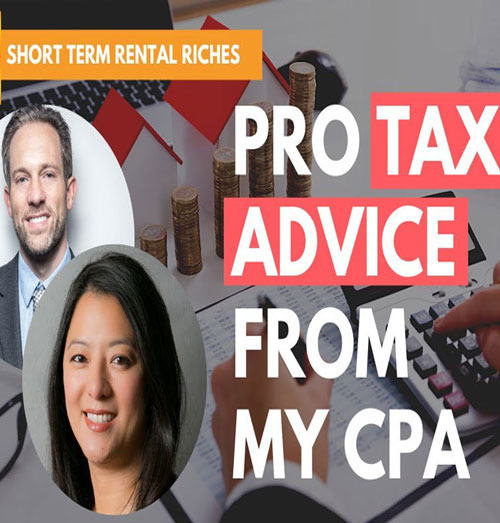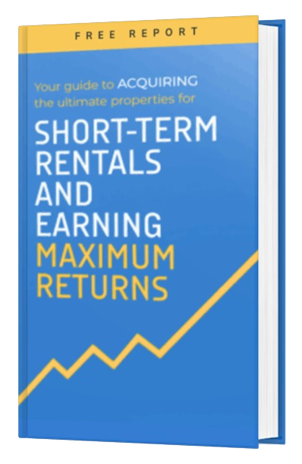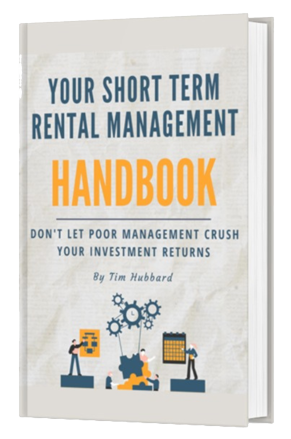220. Six Factors that will increase Supply in Your Market
In this episode, we delve into the crucial topic of increasing supply in the short-term rental market. Understanding the dynamics of supply is essential for every STR investor.
We’ll dive into six specific reasons that could lead to a surge in your local STR market supply. From the impact of regulatory changes to the burgeoning trend of remote work, each factor plays a pivotal role in shaping the landscape of short-term rentals. As we unpack these reasons, remember: knowledge is power, especially in the world of real estate investing. So, buckle up, and let’s explore these insights together, equipping you with the tools you need to adapt and thrive in the dynamic world of STR investing.
In this episode, you’ll learn:
- Understand how relaxed STR regulations can lead to an increase in market supply.
- Learn why new hotels in your area could be both a sign of increased demand and increased competition.
- Explore how shifting population dynamics can impact STR supply.
- Discover how changes in lending and interest rates affect the STR market.
- Uncover the influence of remote work trends on the availability of short-term rentals.
And there you have it – a comprehensive look at the six key reasons behind the increasing supply in the short-term rental market. Remember, while a growing supply can present challenges, it also opens doors to new opportunities and ways to stand out.
Embrace these changes with an open mind and an abundance mindset, and don’t shy away from engaging with fellow STR providers – collaboration can lead to unexpected wins! Stay tuned for more tips, strategies, and insights to help you navigate the world of real estate investing. Until next time, keep your properties bustling and your investment dreams soaring. s
Missed episode 215? It’s the perfect complement to this one, focusing on the reasons behind increasing demand in your market.
Need help managing your short-term rental and you don’t want to go it alone? Shoot us a message here and we’ll see if we can help.
Are you enjoying the podcast? Please subscribe, leave a rating and a review, and share it! This helps us reach others that may find the info helpful as well.
Click Here to view TranscriptA while back, we talked about how the demand might be increasing in your short-term rental market, leading to more revenue for you.
But the opposite is also true in a lot of situations.
There are quite a few reasons why the supply might be increasing in your market, leaving you with lower STR returns.
So stay tuned, we’re going to jump into six reasons why the supply might be increasing in your market today.
Welcome to Short Term Rental Riches.
We’ll discuss investing in real estate, but with a specific focus on short term rentals.
Quick, actionable items to acquire, manage and scale your portfolio.
I’m your host, Tim Hubbard.
Well, welcome back to the Short Term Rental Riches podcast.
I’m happy you’re here again.
Today, we’re talking about, I guess, not the most exciting topic, although there’s always two sides to every story, right?
We’re talking about why supply might be increasing in your market.
I’ve got six reasons for you.
And of course, all investments, all of our economy comes down to supply and demand, right?
And so if the supply drastically increases in our market, while the demand, the amount of short-term renters, in our case, is not increasing, then we might find ourselves in a tough spot with declining returns.
So I’m just gonna jump into the first one here, and that is if regulations ease.
So what do I mean here?
If short-term rental regulations actually get easier for the owner or the investor.
Now you might be thinking, this just doesn’t happen.
Across the board, cities are cracking down on short-term rentals.
They don’t want them.
But that’s not always the case.
In fact, there was just a large court case in Nashville, very popular short-term rental market, that was ruled unconstitutional by the federal government.
So I don’t know all the particulars about this, but Nashville isn’t the only case.
There’s lots of places where regulations are actually getting a little easier.
And why would this be?
Well, cities make millions and millions of dollars from short-term rental taxes.
And it’s also one thing that’s easy for them, right?
Because they don’t have to create a whole new department.
They don’t have to hire a whole bunch of employees.
If Airbnb works out agreement with that city where they’re collecting taxes on behalf of the owners automatically and giving it back to the city, that’s a lot of revenue that’s easy for that city to get.
Now, it’s not just Airbnb that does this.
It’s also VRBO.
And I know a lot of the other OTAs, online travel agencies, are jumping on this bandwagon as well to work together with cities to collect those taxes so the owners don’t have to and so that the city wins at the same time.
So that’s the number one reason.
If the regulations get easier, then it’s easier for someone to open a short term rental, or start a short term rental.
There are less barriers to entry, you could say.
So the number two reason when supply will go up in your market is, of course, if hotels open in your market, hotels and short term rentals are competition, but not always.
Remember, most hotels are built with smaller rooms that aren’t necessarily gonna accommodate larger groups of people, larger families, as easier as a short term rental, as a single family home, for example.
Remember, there’s also a flip side to hotels wanting to open a new location in your market, and that is that they see a lot of demand in your market, otherwise they wouldn’t be opening a hotel.
They do a lot of research, so if you missed our episode 215, go back and check that out.
We talked about reasons why the demand is increasing in your market, which that’s what we want to hear, right?
But this is in fact the flip side.
So if a hotel’s opening in your market, it’s a good sign for demand, but also means there’s obviously gonna be more supply, and you could say competition.
I’ve got a point on that here in just a few minutes.
The third reason why supply might be increasing in your market is if there’s an outflow of the permanent population.
Now, this sounds a little weird, right?
But let’s imagine a scenario where homeowners are living up in snow country, and they’re just tired of the cold.
They don’t wanna live there any longer.
They wanna go down to where it’s warm, like Florida, for example.
But they don’t wanna sell their house because maybe the market’s not good.
Maybe we’re in a situation like right now where interest rates are high and less people can actually afford to buy those homes.
So what is their alternative option?
Well, they can either rent it long term, which obviously a lot of people do, or if they’re in a market that’s favorable for short term rentals, they very likely could list it as a short term rental.
So this is a bit of a more subtle scenario.
This might also happen if someone’s living in a rental market or vacation rental market that’s seen the demand, a huge increase in demand for short term rentals, and they realize, shoot, I could leave this market, rent out my property here, which lots of people are renting for vacations, and earn enough money to basically live wherever I want.
So, they’re not gonna wanna sell that property, right?
But they very likely would put it as a short term rental, and that’s going to increase supply in that market as well.
The fourth reason why supply might be increasing in your market is quite simply if money becomes more available.
If money is more available, then more people can buy rentals, including short term rentals.
Of course, we saw this after COVID and the trillions of dollars that got pumped into the economy.
Seemed like everyone had money, right?
It was literally falling from trees.
People didn’t know what to spend it on.
The stock market went up, all these bubbles were created, and a lot of people bought short term rentals because they could.
Now, we’re in a slightly different situation, right?
Interest rates are much higher.
The amount people are saving is going down and down as inflation has eroded a lot of our spending power.
But the reality here is that if interest rates go back down and banks are willing to loan, then that means that more people could potentially be buying short terminals in your area, increasing the supplies.
Remember, there’s two separate things there, right?
If interest rates go down, that means that loans will be more affordable, but that doesn’t necessarily mean that banks are going to be giving out loans, right?
We saw this after 2008, 2009 crash, where banks received a lot of foreclosures.
It was much harder to get a loan.
So remember, those are two separate things, but the main point here is that if money is more affordable and available, more people are going to be buying properties, which includes short term rentals.
I’ve dedicated years and hundreds of thousands of dollars through trial and error to figuring out how to manage my personal portfolio remotely.
And it wasn’t always easy, and it took a long time, but now my amazing team can professionally manage my properties without me.
And good news, our team can also manage yours.
Let us save you the stress and headaches and some money by offering you an industry low fee.
To find out more about partnering with us, head to strriches.com, hit the property management button, answer a couple of quick questions, and meet with me personally.
That’s strriches.com.
Rest easy knowing that with my team, your properties will be in excellent hands.
The fifth reason why supply with short term rentals might be increasing in your market is because of the ability to work remotely.
So we all know that the ability to work remotely has gone through the roof, right?
Offices are sitting vacant, whereas just a few years ago, they were filled right in downtown areas.
People value working remotely.
And as we know, that is not going away.
In fact, a lot of people that we hire on our team, one of the reasons that they enjoy working for us is because they can work virtually, right?
We’re completely virtual.
They don’t have to commute.
They don’t have to do anything like that.
They can spend more time with their families.
So this trend is clearly not going away, especially with new technology.
And so one thing to keep in mind, and this is maybe a reason why supply might be increasing a little further out in the future, but as we continue to be able to work easily remotely, places that have really great weather and places that are not, that don’t have high crime rates and places that are affordable are gonna draw a lot of people.
That is a fact.
I know that.
So these are places that could barely likely see more supply because of remote work.
We also have to look at tertiary markets, right?
So smaller cities around bigger cities where it’s much more affordable to live.
And these people that were once working in the city, in the city center, don’t need to work there anymore.
These tertiary areas around larger cities are also gonna be seeing an increase in supply.
So this is more of a long-term trend, right?
We saw a big upswing or big uptick in this right after COVID because people couldn’t do anything in the cities.
But this trend will continue, I believe, especially in those places where the crime rates are lower and it’s more affordable and where the weather is a little bit better.
So remote work is definitely gonna be increasing supply in areas like this.
Okay, so here we are.
The sixth reason why supply might be increasing in your market, and that is simply because of the media, of the news, of top short-term rental investment market lists, right?
We know how powerful the media is these days and it can truly drive a lot of new supply into a market.
So if we look at top lists, for example, maybe ones that are produced by AirDNA or some of the more well-known short-term rental companies that manage data and that release a lot of newsletters and things like that.
A lot of times they have Nashville is number one, Austin is number two, Seattle was number three.
And so we’ve talked about this before.
Those three markets I just mentioned, for example, are not very affordable at all.
In fact, it’s really expensive to buy property in those three areas in particular, amongst a whole bunch of other ones.
We’ve got to remember that a lot of times these top investment lists are not the best place for us to get a return, because if the property is much more expensive, then we have to earn a much higher return, right?
So be careful with those top rental lists, top investment lists, but the reality is that the media can drive a lot of new supply in a market.
If someone suggests getting into real estate, this is a lot of times where people base their decisions off.
The other side of the media or lists you could say are maybe best places to live.
And so remember a lot of people with short term rentals are using these homes as sort of a second residence.
So top place to live might induce someone to want to buy a property there where they’re going to use it part time leading to more supply in that market.
So there we go.
There’s six reasons why supply might be increasing in your neighborhood.
And you might be thinking, gosh, Tim, this sounds scary.
I would hate to buy a property in one of these areas and not know how the supply is going to impact the amount that I actually charge for my property.
One way that you can check this out or at least get a historical view of this, remember our historical data doesn’t guarantee future performance, right?
But one easy way to take a look at this is to use price labs, for example, or you can use Wheelhouse or Beyond Pricing.
These dynamic pricing tools that we’ve talked a lot about, they show the amount of units in a certain market, and they also show the average daily rate in these markets.
So what we can do is we can go back over maybe a couple years, and let’s just choose Austin, for example.
Let’s say two years ago, it had 25,000 properties, and the average daily rate was $250 a night.
And here we are two years later, and it has 50,000 properties.
So maybe it doubled, but the average daily rate is now $500 a night.
That would be a situation where the supply has not impacted the demand or the returns, you could say, of these properties.
It’s basically kept constant, but now let’s look at those same numbers and say, it went to 50,000 properties, but the average daily rate was still just $250.
Well, that would mean that there’s twice as much supply, fighting for those same lower daily rates.
So what we want is a market where the supply is going up, but the average daily rate is also going up consistent with it or hopefully even more than the supplies going up.
So just know you can get these numbers from companies like Pricelabs or airdna.co.
It’s a great way to check out a market on a historical look and just get a general idea if the supply is really outweighing the demand.
If it is, it’s probably a market that you wanna be a little careful with.
So the last thing I just wanna leave you with here is that when we think about supply coming into market, we think it’s competition, right?
And yes, it is.
We’re one rental renting to the other one, but it’s good to have an abundance mindset.
The other thing that we know is that not everyone is managing their properties professionally.
So we have a lot of opportunity there to make sure that we’re at the top of our game and we can earn much more than the same exact property next door based on our communication, based on our reviews, based on the whole experience that we provide.
But I just wanna leave you with one little story.
When I was first getting started in New Market, I was staying in a short-term rental on the same street where I was planning on buying a property to do the same thing, rent them as short-term rentals.
I ended up talking to that owner of the short-term rental where I was, and I told them, I said, hey, I’m actually in contract for this property down the street, I love what you’re doing here, I think there’s a lot of opportunity, and that is my plan for the property I’m looking at acquiring.
And there was no pushback, she was very open, and she was very helpful, and she actually helped me get that property.
So what happened?
I was buying this property out of state, I didn’t know a lot of the local lenders, and at the very last minute, the lender pulled out and they said, Tim, sorry, we just, we can’t give you that, we can’t give you the loan, no, we don’t know you.
This is when short-term rentals were much newer, right?
And people weren’t that familiar with them, banks weren’t that comfortable with them.
And so I called up Shirley, that was the lady whose property I was staying at, I said, Shirley, we actually became pretty good friends, like in between this inspection period.
And I said, it doesn’t look like the property’s going through, it’s very last minute, and the lender backed out, and she said, well, why don’t you call the bank that I work with?
And I said, okay.
And I called them and I said, sure, Tim, we’ll do that deal, and oh, you’re renovating, and we’ll also provide you the money for the construction.
How’s that?
So had I not been upfront and talked with Shirley about what I was doing, which is, in other words, you could say competition, I would have never had that property, would have never had that opportunity.
So remember, as more short-term rental providers are coming in, we can grow together.
Airbnb just had their most profitable quarter ever in the history of the company, and so demand is going up, people enjoy staying in short-term rentals.
There’s plenty of opportunity for all of us.
Do not be scared or intimidated to talk to your neighbor that’s also operating a short-term rental, because I guarantee you, you’ll be able to learn some things from them, and you guys can help each other.
So I hope that gave you a little bit of insight.
I hope your properties are staying occupied.
And until next time, I hope you have a wonderful day.
If you’ve been listening to the podcast for a while, well, then you know that I love technology, and we can save a ton of time implementing AI artificial intelligence in the right ways.
My team and I have been playing around with this for months, and we’ve written the perfect prompts that you can just plug in to your favorite AI tool, like ChatGPT, to help you uncover exactly who your guest avatar is, help you write your listing descriptions, help you write your photo captions, and so much more.
It’s a living, breathing document that we’re consistently working on, and I’d love to give it to you for free for being one of our loyal listeners.
You can head over to restmethods.com forward slash AI and get your copy for free.
I hope it helps you along your short-term rental journey.



















